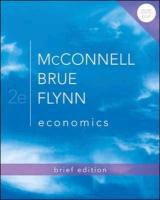En savoir plus
McConnell, Brue and Flynn's
Economics: Brief Edition, 2e comes from the same author team as the market-leading Principles of Economics textbook.
Economics: Brief Edition tailors the core concepts from proven leader
Economics, 19th edition to create a concise introduction to the course that is distinct in purpose, style, and coverage. Like the 19th edition,
Economics: Brief Edition, 2e continues to be innovative while teaching students in a clear, unbiased way. Content and pedagogy have 3 main goals: help the beginning student master the principles essential for understanding the economizing problem, specific economic issues, and the policy alternatives; help the student understand and apply the economic perspective and reason accurately and objectively about economic matters; and promote a lasting student interest in economics and the economy.Connect is the only integrated learning system that empowers students by continuously adapting to deliver precisely what they need, when they need it, and how they need it, so that your class time is more engaging and effective.
Table des matières
Part One: IntroductionChapter 1Limits, Alternatives, and ChoicesChapter 2The Market System and the Circular FlowPart Two: Price, Quantity, and EfficiencyChapter 3Demand, Supply, and Market EquilibriumAppendix 3W: Additional Examples of Supply and DemandChapter 4Elasticity of Demand and SupplyChapter 5Market Failures: Public Goods and ExternalitiesPart Three: Product MarketsChapter 6Businesses and Their CostsChapter 7Pure CompetitionChapter 8Pure MonopolyChapter 9Monopolistic Competition and OligopolyPart Four: Resource Markets and GovernmentChapter 10Wage DeterminationChapter 11Income Inequality and PovertyChapter 12Public Finance: Expenditures and TaxesPart Five: GDP, Growth, and InstabilityChapter 13GDP and Economic GrowthChapter 14Business Cycles, Unemployment, and InflationChapter 15Aggregate Demand and Aggregate SupplyChapter 16Fiscal Policy, Deficits, and DebtPart Six: Money, Banking, and Monetary PolicyChapter 17Money, Banking, and Financial InstitutionsChapter 18Interest Rates and Monetary PolicyPart Seven: Long-Run Considerations and International EconomicsChapter 19Long-Run Aggregate Supply and Aggregate DemandChapter 20International Trade and Exchange Rates
A propos de l'auteur
Campbell R. McConnell earned his Ph.D. from the University of Iowa after receiving degrees from Cornell College and the University of Illinois. He taught at the University of Nebraska-Lincoln from 1953 until his retirement in 1990. He is also coauthor of Contemporary Labor Economics, Seventh edition, and Essentials of Economics, First edition (both The McGraw-Hill Companies), and has edited readers for the principles and labor economics courses. He is a recipient of both the University of Nebraska Distinguished Teaching Award and the James A. Lake Academic Freedom Award, and is past-president of the Midwest Economics Association. Professor McConnell was awarded an honorary Doctor of Laws degree from Cornell College in 1973 and received its Distinguished Achievement Award in 1994.
Résumé
Helps the beginning student to master the principles essential for understanding the economizing problem, specific economic issues, and the policy alternatives. This title also helps the student to understand and apply the economic perspective and reason accurately and objectively about economic matters.

